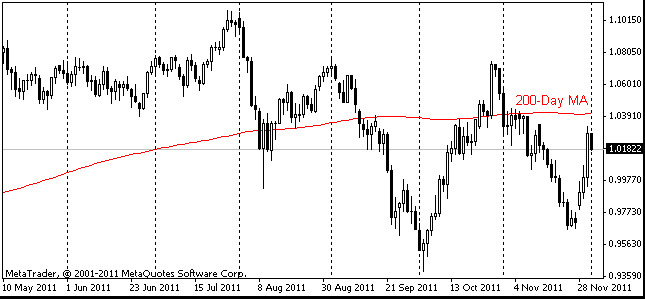EUR/usd
It didn't take much time for the market participants to rebalance their positions, and yesterday the common currency was again pushed down to new local lows. This time it was much easier to break through the defence line, once really strong at 1.2620. Last week the attempt was foiled just like in January 2012 and at the end of August 2010. The talks of the EU politicians about the development of the Greek exit plan tipped the scale. Earlier from February till the end of April the consolidation was mainly held within the corridor above 1.30 and below 1.34. Something like that was happening in 2011, when from April till August the euro/dollar was fluctuating within a relatively steady channel. Only a keen eye may notice that now as well as then the pair is mainly controlled by the bears, posting lower highs and lower lows time after time. Breaking through the support level (when the bulls finally gave in at 1.40) sent the pair down to 1.31. Only then the sales stopped for a while. We'll probably see something like that this time as well. The single currency is moving stepwise from 1.40 to 1.30. So the next stop is now expected only at 1.20. If it is caused by mere concerns about Greece's disintegration and Greece itself remains in the euro bloc, many periphery markets will get a chance to enhance their competitiveness, which is so much dreamt of. Of course, the healthy manufacture of Germany and large investments into this country on the capital outflow from other states will play right in the hand of the German locomotive. We've described a rather smooth run of events. But the anticipation of a tougher turn is weighing more and more heavily on the market participants. It is feared that at the elections in June Greece will select the secession from the euro zone and again adopt the drachma. It's not clear yet how the country's debts will be converted then. But what really alarms is the growing accord among the EU leaders. Cameron has nothing against Greece's exit and, as rumoured, Merkel is also ready to put up with it.

GBP/USD
The sterling is even more technical than the euro. Having fallen out of the channel, it was accelerating for three days in a row. Then for a while it consolidated at the 200-day moving average level, to which the pair has frequently stuck this spring. However, for the last three days the pair has been on the decline. Now the pound is trading at 1.5670 and the next important level of support is at 1.5600, but already now the pair looks oversold. Probably, the pair will extend its decline and tomorrow will want to correct upwards. Earlier today we saw the release of the revised British GDP data for 1Q. They proved to be even worse than the initial estimate. Over the first three months the economy lost 0.3% and went in the red annually. April's retail sale figures, published yesterday, turned out to be very weak, which makes the quick recovery of Britain from the recession hardly possible. And it's no good that under such circumstances the Bank of England does nothing.

AUD/USD
Apart from the euro which is very weak due to the concerns about the euro zone's integrity, there is one more developed country, the currency of which suffers even a greater pressure. Except for short-term and rare consolidations AUD/EUR has generally been within the uptrend since February. Only this week the pair has managed to consolidate. Yet, AUD/USD actively keeps falling. In the chart it is clearly seen that the daily movement is smooth and ordered. Traders close numerous long positions on the reduction of the interest rate differential and anticipations of its further contraction. If we got the country's politicians right, that's what they have been aiming at when combating the high cost of their currency.

USD/JPY
The story of rate declines would be incomplete without USD/JPY today. This pair again bounced off the upper boundary of the downward channel yesterday. And though by now the pair has stabilized at 79.50, the prospects that the story of the USD/JPY will turn into the story of the JPY decline are rather dim. For that the Japanese politicians should take more active measures that for some reason they don't seem to favour now.
